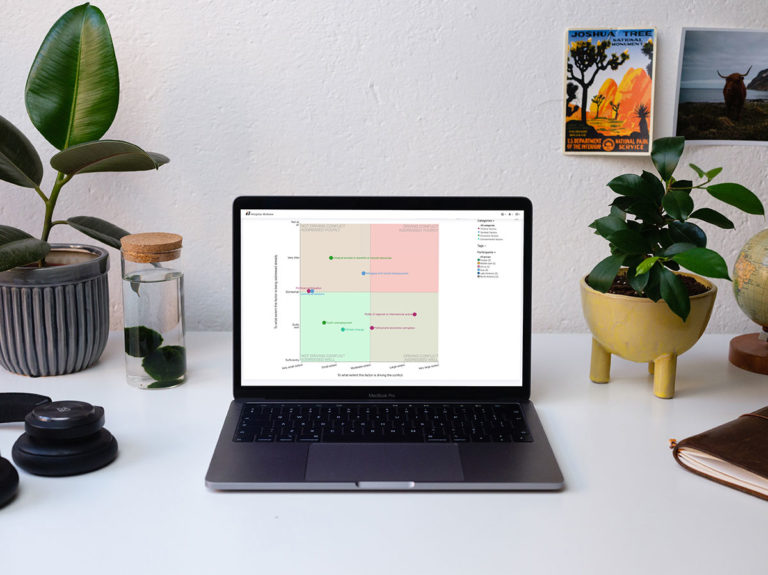Engagement in modern risk management centers around collaboration that extends way beyond a solitary back office function. Engaging risk management embraces the expertise of individuals throughout the organization, including frontline workers, line managers, country teams, and top management. The active involvement of all stakeholders is key to achieving successful outcomes.
Five key trends have emerged in the constantly evolving landscape of risk management and compliance: Agility, Resilience, Integrity, Accountability, and Engagement. In a recent Inclus webinar, Michael Rasmussen briefly introduced each one. So far in this article series we have discussed Agility, Resilience, Integrity, and Accountability.
Engagement is the fifth emerging trend in risk management: How to tap into the tacit knowledge of numerous frontline experts around the organization? How to make sure that they feel that their voice is being heard and they have a say on how various risks and opportunities are being recognized, assessed, and treated in the organization.
Modern risk management: From a back-office function to daily frontline (and back-office) commitments
The engagement of employees at all levels of an organization in risk management is a critical aspect of modern risk management practices, as Michael Rasmussen in his webinar presentation highlights. Here are some of the discussed ways of engaging employees in recognizing, managing, and mitigating risks – together.
1. Foster inclusive decision-making
Michael Rasmussen emphasizes that risk management isn’t confined to the back office; it’s a pervasive aspect of every business operation. Engagement ensures that risk decisions are made inclusively, involving executives, board members, line managers, operational managers, project managers, and frontline employees. This inclusivity is crucial because it acknowledges that risks can arise at any level and in any department of an organization.
“Inclusivity is crucial because risks can arise
at any level and in any department of an organization.”
2. Recognize real-time impact
Every day, individuals at various levels within an organization make decisions that have immediate and long-term consequences. These decisions impact projects, business operations, transactions, patient safety, privacy, environmental concerns, and health and safety, to name just a few. Engaging all stakeholders in risk management allows for real-time recognition of potential risks and enables timely responses to mitigate them.
3. Empower frontline employees
Engaging frontline employees is particularly important because they are often closest to the day-to-day operations. In sectors such as healthcare or mining, where safety and privacy are crucial, their decisions can directly affect outcomes. By involving these employees in risk management practices, organizations empower them to actively contribute to risk identification and mitigation, enhancing overall safety and efficiency.
4. Enhance technology and processes
Michael Rasmussen emphasizes that effective engagement in risk management requires better technology, processes, and information. Modern technology tools, such as Inclus’ collaborative platform, facilitate engagement by providing the necessary information and insights to all stakeholders. This technology enables more informed risk-related decisions.

5. Implement proactive risk management
Engagement in risk management shifts the focus from a reactive approach to a proactive one. Instead of merely responding to risks as they arise, engaged organizations actively seek out and identify potential risks before they escalate. This proactive approach helps prevent crises and minimizes the negative impact of risks on the business.
“Engagement in risk management shifts the focus
from a reactive approach to a proactive one.”
6. Cultivate holistic risk awareness
Engagement fosters a culture of holistic risk awareness throughout the organization. When all employees are actively engaged in risk management, they become more attuned to the potential risks associated with their roles. This heightened awareness encourages a collective effort to identify, assess, and mitigate risks effectively.
7. Drive continuous improvement
Engaging in risk management practices provides a feedback loop for continuous improvement. By involving all stakeholders in the risk management process, organizations can gather valuable insights and feedback, enabling them to refine their risk strategies over time.
In summary, engagement is crucial in modern risk management practices because it ensures that risk decisions are made inclusively, empowers all employees to actively contribute to risk mitigation, and enables organizations to adopt a proactive approach to risk management.
By embracing engagement, organizations can foster a culture of collective responsibility and vigilance, ultimately enhancing their resilience and ability to navigate the complex world of risk.
This article series is based on our recent webinar where Michael Rasmussen, ‘the father of GRC’ (Governance, Risk and Compliance) discusses trends in risk management together with Inclus’ CEO Mikaeli Langinvainio. Along with introducing the five major current trends in risk management, Agility, Resilience, Integrity, Accountability, and Engagement, Michael and Mikaeli discuss how organizations can leverage risk management as a discipline and process for sustainable success in today’s dynamic operational landscape.

Michael Rasmussen




